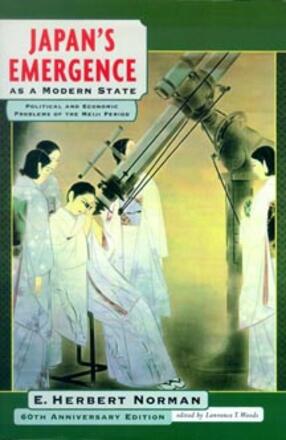Forewords / R. Gordon Robertson, Len Edwards, and William
L. Holland
Editor's Preface
Introduction: The Contemporary Relevance of Herbert Norman's
Emergence / Lawrence T. Woods
Japan's Emergence as a Modern State
Foreword
Author's preface
I. Introduction
II. The background of the Meiji restoration
The decay of feudalism
The forcing of the closed door
III. The restoration
Historical background of the feudal-merchant coalition
The clan monopoly system and its effects on feudal-merchant
relations
Introduction of capitalism into the clans
The feudal-merchant alliance and the Meiji restoration
Origin of the modern bureaucrat in the movement for clan reform
The agrarian movement in the early Meiji period (1868-77)
The lower samurai as leaders of the Meiji restoration
The split over a Korean expedition Continued opposition to the
government ends in civil war
Anti-feudal policy of the Meiji government: Its attitudes toward the
feudal daimyo and landlord class
Conclusion: Factors which conditioned the establishment of a modern
state in Japan
IV. Early industrialization
Production and circulation of commodities
Division of labour
Accumulation of capital
European and Japanese mercantilism compared
Predominance of banking capital in Japan
Role of foreign capital in early Japanese industrialization
The history and influence of strategic industries
Starting point of Japanese industrialization conditioned by military
necessity
Change in industrial policy and the law for the transfer of
government factories
The key industries and the bureaucracy
V. The agrarian settlement and its social
consequences
The trend toward private ownership in land
Land tax revision of 1873
Dispossession of the peasantry
Comparison of peasant dispossession and its effects in Japan and
England
Minute-scale farming in Japan: Its cause and effects
Social character of the Japanese tenant farmer
The question of a stagnant surplus population and the creation of
the labor market
Creation of a home market and its limitations
VI. Parties and politics Agrarian movement of the second
period, 1877-83, and rise of the Liberal Party (Jiyuto)
Outline of early political societies and parties
The government policy toward political parties
New shift of agrarian revolt following dissolution of jiyuto in
1884
Strengthening of the state: The constitution of 1889
Political parties and the Diet Foreign policy and international
relations
How the struggle for national independence inevitably led to
expansion
The position of a Liberal opposition and the question of
"military versus civil" in the Japanese government
Conclusion
Selected bibliography on Meiji Japan
Glossary
1. The Importance of Rereading E.H. Norman / Herbert P.
Bix
2. On Norman's Emergence / Roger Bowen
3. The Historian in His Times: E.H. Norman and Japan / John W.
Dower
4. E.H. Norman's Emergence and the IPR / Paul F.
Hooper
5. Emergence in Context / John F. Howes
6. The State of Japanese Political Studies: Lessons from E.H. Norman
/ Patricia Maclachlan
7. Emergence and After / Nagao Ryuichi
8. Emergence as History / George M. Oshiro
9. E.H. Norman and Japan's Emergence as a Neo-Modern State /
M. William Steele
10. An Economic Aspect of the Meiji Restoration / Tsuru
Shigeto
Contributors
Index
